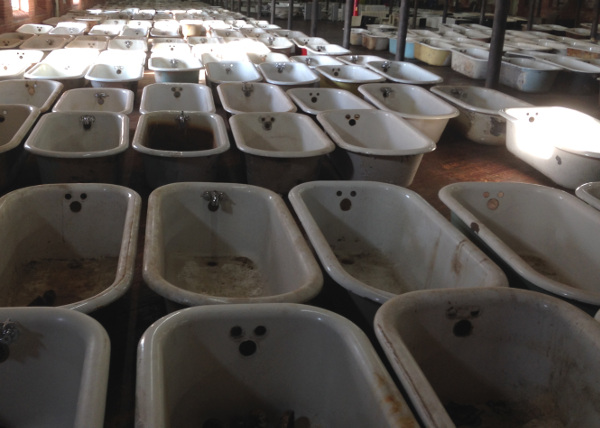Info, news & debate
People

Why the banks have so much power and how we can take it away from them
I mentioned a while ago that I’m enrolled on a MOOC (massive, open, online course) about banking and the money system. As promised, I’m blogging about some of the things that I’ve learnt (we’ve covered the definition and history of money so far).

The Trump administration is going to attack us if we try to restrict the imports of US genetically-modified food in any way
Linda Kaucher of Stop TTIP UK recently alerted us to the fact that the US government is determined to go into battle with any country that tries to restrict imports of its genetically-modified food.

The Wool Journey Part 1: what is wool?
In the first of a series of guest blog posts from Sue Blacker and colleagues at The Natural Fibre Company, we invite you to embark upon The Wool Journey, exploring the what, how and why of all things wool.

Should we not mention what’s happening to the biosphere, in case it scares the mainstream?
This is a question for anyone working in the field of environmental sustainability. What’s actually happening to the biosphere, how bad is it, and should we tell people or keep it quiet?

In praise of the domestic larder: an alternative to the modern fridge
Once a mainstay of households in times gone by, the humble larder provided a practical storage solution for foodstuffs requiring storage over a longer period of time.

A year of downshifting in Devon
Downshifting means working less, earning less and spending less and it’s what Lowimpact.org’s Sophie Paterson has spent the past year attempting to do. She shares what she’s learnt so far and why she’d encourage others to embrace downshifting too.

It’s worse than you think: review of Douglas Rushkoff’s ‘Throwing Rocks at the Google Bus’
Here’s an article that’s part review of the latest book by Douglas Rushkoff (buy it – it’s excellent), part ramble about twenty-first century capitalism.

Community building camps: volunteer on community projects and gain natural building skills
A volunteering event to make beautiful natural buildings affordable for schools, charities, community groups, trusts and pubic organisations who put other people and the environment first.

Taking the pee: is urine a good fertiliser?
Many of us consider it a waste product but, in fact, is urine a good fertiliser? Scarlett Penn of WWOOF UK sets out why we should pause for thought before we flush.

What’s the most environmentally-damaging thing that a human can do?
This question is really important for us at Lowimpact.org, because we’re all about providing information and other resources on ways that people can live in a less environmentally-damaging way. So I was very interested to see that researchers at Lund University in Sweden recently put the hours in

SuperHomes: free open-house events for you to have a look at homes with renewable and energy-saving technologies
This year marks the 10th year of SuperHomes, the innovative and multi-award winning national network of over 200 homes which have all reduced their carbon footprint by a minimum of 60%. There’s a record 100 free Open House events occurring across all parts of UK

Crabapple community is looking for new members
This information is now out of date, but here’s Crabapple’s website. Contact them if you’re interested. Thanks

B-corporations – yes or no?
What do you consider the correct approach towards multinational corporations – tame them, or start to get rid of them? And what do we mean by ‘tame’ exactly? And what are the problems with multinational corporations in the first place?

The great Human Power Plant experiment
Taking pedal power to a whole new level, an ambitious project will see the conversion of a 22 floor building into an entirely human powered community of 750 students at Utrecht University in the Netherlands. Dubbed the Human Power Plant, Kris de Decker of Low-tech Magazine and artist Melle Smets will lead a team exploring the …

Waste not, want not: 5 tips for collecting salvaged building materials
Using salvage building materials brings new life to otherwise discarded items. Reusing materials can inspire creativity and reduce construction costs. But you need to have a plan, or you risk spinning your wheels and burning out from all the leg work involved.

Opportunity to achieve a permaculture livelihood on a couple of acres on Devon/Cornwall border
Hi, I have a small piece of land (approx. 1.75 acres) with small barn on the Devon-Cornwall border that I would really like to make available to someone committed to creating a permaculture lifestyle.

Seeking a venue: course on how to create a One Planet Development
I am seeking venues around the country to run an exciting course that will help participants prepare for starting and living on a One Planet Development.

Ecological Land Co-op share offer extended after exceeding target: help us change the way land is owned in the UK
WOW! We’ve surpassed our initial maximum target of £340,000, and there are still FOUR days to go. Our new investors are helping us continue our work supporting small-scale, agro-ecological farming. Thank you!

My plastic-free life: an interview with Kate Armstrong
You may remember from our post in May that the month of June marks The Marine Conservation Society’s Plastic Challenge. But what is it actually like to give up plastic? We spoke to campaigner Kate Armstrong of plasticisrubbish.com about her decade-long journey towards and campaign for a plastic-free existence.

Part-time work available in the Lowimpact.org team
We are offering a little part-time job. It’s only around 10 hours per month, so it could fit in nicely with what you’re doing already. It involves looking after a category on the Lowimpact.org site, and keeping everything updated.
